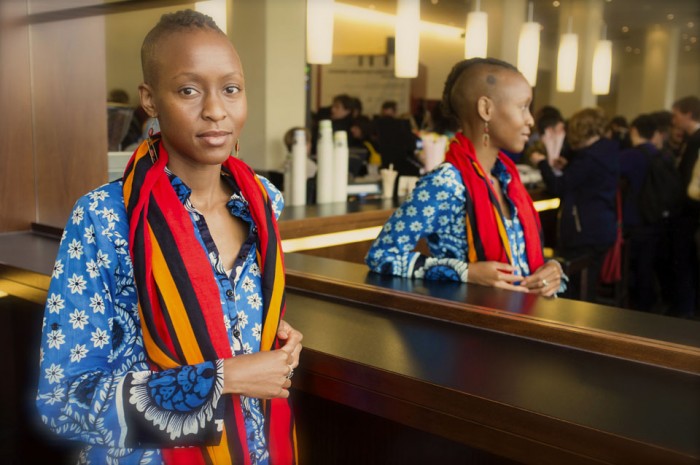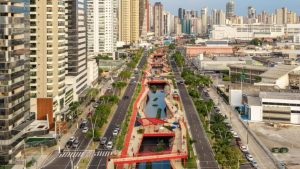Part of the Project

Ng'endo Mukii is a mixed-media artist who uses a combination of pixillation, stop-motion live action and hand-drawn animation to great effect in her multi-award-winning short film, Yellow Fever. Through memories and interviews, Yellow Fever explores the way media affects how women see themselves – especially African women – and comments on the media's Eurocentric portrayal of female beauty.
Yellow Fever was Ng'endo’s thesis project at the Royal College of Art in London where she obtained her Master of Arts in Animation in 2012. She first received her bachelor's degree in film animation and video from the Rhode Island School of Design (RISD) in the US Initially when she enrolled at RISD, she imagined becoming an illustrator or painter, until she discovered film and animation. The rest, well, is history. She does, however, paint and draw in and on her film, video and animation work. “I tend to instinctively employ the medium I feel works best for the content being explored,” she says.
Ng'endo is one of five recipients of the Focus Features Africa First film grant. She is working on the pre-production of her next film, The Teapot, with the awarded funds.
What made you return to Kenya after studying and working in the US and the UK?
Ng'endo: Deciding where to live and work is always influenced by many factors. When I completed my studies in the US I remember finally having the sense that I was not constantly chasing something outside my reach and running myself into the ground. The Rhode Island School of Design has a tough curriculum and senior year brought many sleepless nights and a constant state of emergency.
When we graduated, the pace changed. I remember promising myself that I would "never under ANY circumstances" treat my mind, body and soul to such a battery of demands, lack of food (I would forget to eat when working) and stress, for the sake of a project. I decided to give myself a year in the U.S. to work and travel, explore different parts of the country and discover the things that had been under my nose for the previous four years. And that’s what I did.
I worked out how much money I needed to allow me the freedom to do other things. I got work that was flexible enough to allow, and even require me, to travel. I saved up for trips and visited friends to help them on projects. I pranced across as many states as possible and took it in, so to speak, because I knew I wanted to go home at the end of it all. That’s how I lived for a year, then packed up and came home.
There was a "now or never" element to it as well. When you come to adulthood in a foreign country, and form very strong bonds with the people and places around you, it can seem almost impossible to separate yourself from this new family and return home. Sensing this I gave myself this deadline, ignored all the calls to renew visas and apply for different work permits as well as the panicked question, "But what will you do in Kenya!!?" and stayed focussed on the final destination: Nairobi.
By the time I got home, I had not seen my family for six years. And, not to sound foreboding or anything of the sort, I think it is important that we consider how the separation of distance and time affects this basic core unit of society. That being said, I grew up imagining that whatever art I would create, would reflect something of my home and my experiences as a Kenyan.
What I wanted to harvest by training abroad was technical skill and to open myself to the possibilities of different ways of thought. By doing so I could better express my own personal interpretation and experiences of my home.
The two years spent at the Royal College of Art in London gave me the space I needed to reconfigure my work process and decide what type of work I wanted to be creating as an artist. The students were brilliantly gifted and hardworking, and this created a strong work ethic with a lot of creative ideas being shared among us.
Coming back home from the UK was a much less complicated affair. The anti-immigration rhetoric flaunted by Theresa May and the like painted international students as a drain on national resources and the cause of unemployment across the country. Policies were changing repeatedly, and taking effect immediately. Within a few months of living in the UK I knew it was not the place for me beyond school. It was quite disappointing to spend years of savings on exorbitant school fees in a foreign country that then claims you're misusing their National Health Service on your broken leg.
How does living in Nairobi affect your work? You said in an interview about returning to Kenya that everything felt new again. Do you find this "newness" has given you a renewed energy for filmmaking?
There’s a beauty in returning home after being away for a long time. When I came back from the US, the sensation of unlocked memories resurfacing was overwhelming. I realised how interconnected my recollections were with my physical location. I walked through old territories retracing faded paths to memories, dreams and visions that had been washed into darkness with each day spent on distant soils.
I took to the camera to document my rediscoveries, but also as a buffer between myself, who was now a stranger, and the strangeness of my home. This "newness" allowed me to watch with the luxury of subjective distance, yet forced me to reflect on the relationships we have within our society and with the outside world in which I had lived. I think you form a different sensitivity based on having been away. There is also a sense of nostalgia that quietly seeps out of you over time, as you acclimatise, and I find that in-between period particularly stimulating.
You went to study with the intention of being an illustrator/painter and became a filmmaker/animator sort of by accident. Were you aware, growing up in Kenya, that the work you currently do was a possibility as a career, i.e. was there an established film and animation industry in Kenya at the time when you left to study abroad?
When I was growing up I would never have considered anything in television or film as a career. I remember sitting on the carpet waiting for the VOK (Voice of Kenya) channel to come to life. Testing bars and tone played across the screen, and I would turn the TV on and off because I didn't yet know how to read time and neither was I patient enough to wait for the hour.
When the VOK news came on, a large portion of the broadcast would be spent informing us what the president, Rais Daniel Toroitich Arap Moi, had been doing all day. A full-cheeked, bright-eyed, curly-haired dashing version of himself would stare back at us benevolently in a three-quarter profile pose, while a female presenter told us which areas of the country he had visited, and how many plots he had given to grandmothers across the land (cut to smiling grandmothers holding title deeds and Baba wa Taifa [Fater of the Nation] walking stoically). It wasn't quite the appropriate environment to spark creativity, freedom of thought or personal expression. The most creative individual might have been the weatherman, but I was mostly interested in the clouds and lightning bolts that he attached to the map of Kenya.
As I started to colour in pictures, draw my own, and make flip books in my homework diary, I somehow didn't make the connection to the cartoons I would watch on the weekends. The cartoons and films we watched as children "just were", and I never questioned who or what had created them.
The change in Kenya over the last 15 years is drastic. Multiple broadcasters have sprung up; stations run 24 hours a day; cable and satellite TV is available; our production companies are churning out content to air locally and beyond our borders; women are writing apps and digital cities are being drawn up. While growing up, these opportunities were not available because this infrastructure did not exist.
As a side note, the first time someone asked if I had ever considered animation, I started laughing, thinking "What type of sad person wants to spend the rest of their life drawing pictures and moving objects over and over again"
And, here I am.








